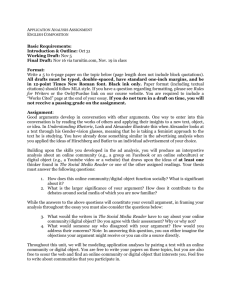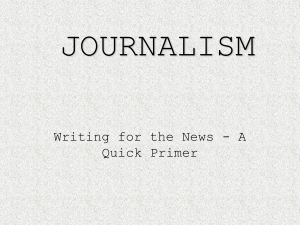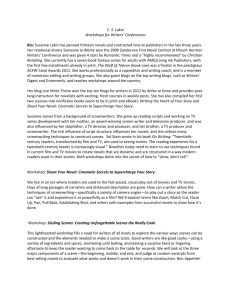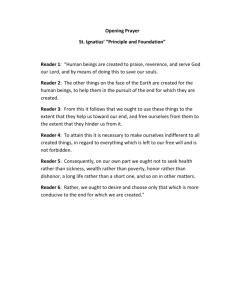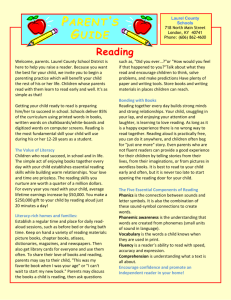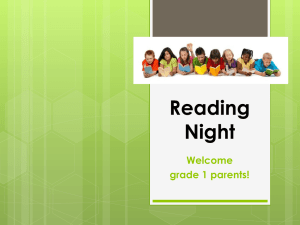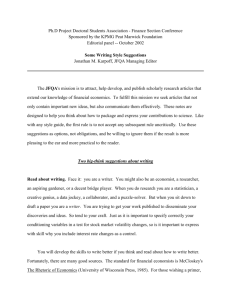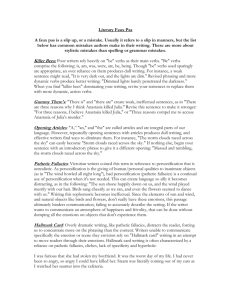Sample Craft Course Syllabus: First Fiction
advertisement
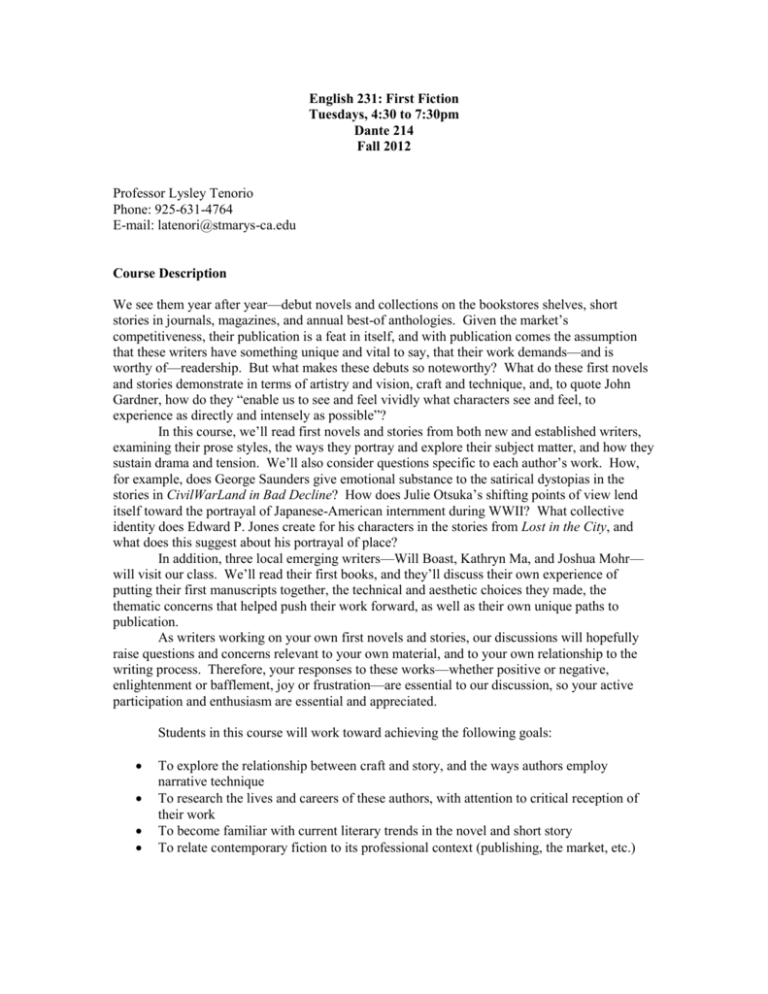
English 231: First Fiction Tuesdays, 4:30 to 7:30pm Dante 214 Fall 2012 Professor Lysley Tenorio Phone: 925-631-4764 E-mail: latenori@stmarys-ca.edu Course Description We see them year after year—debut novels and collections on the bookstores shelves, short stories in journals, magazines, and annual best-of anthologies. Given the market’s competitiveness, their publication is a feat in itself, and with publication comes the assumption that these writers have something unique and vital to say, that their work demands—and is worthy of—readership. But what makes these debuts so noteworthy? What do these first novels and stories demonstrate in terms of artistry and vision, craft and technique, and, to quote John Gardner, how do they “enable us to see and feel vividly what characters see and feel, to experience as directly and intensely as possible”? In this course, we’ll read first novels and stories from both new and established writers, examining their prose styles, the ways they portray and explore their subject matter, and how they sustain drama and tension. We’ll also consider questions specific to each author’s work. How, for example, does George Saunders give emotional substance to the satirical dystopias in the stories in CivilWarLand in Bad Decline? How does Julie Otsuka’s shifting points of view lend itself toward the portrayal of Japanese-American internment during WWII? What collective identity does Edward P. Jones create for his characters in the stories from Lost in the City, and what does this suggest about his portrayal of place? In addition, three local emerging writers—Will Boast, Kathryn Ma, and Joshua Mohr— will visit our class. We’ll read their first books, and they’ll discuss their own experience of putting their first manuscripts together, the technical and aesthetic choices they made, the thematic concerns that helped push their work forward, as well as their own unique paths to publication. As writers working on your own first novels and stories, our discussions will hopefully raise questions and concerns relevant to your own material, and to your own relationship to the writing process. Therefore, your responses to these works—whether positive or negative, enlightenment or bafflement, joy or frustration—are essential to our discussion, so your active participation and enthusiasm are essential and appreciated. Students in this course will work toward achieving the following goals: To explore the relationship between craft and story, and the ways authors employ narrative technique To research the lives and careers of these authors, with attention to critical reception of their work To become familiar with current literary trends in the novel and short story To relate contemporary fiction to its professional context (publishing, the market, etc.) Course Text Power Ballads, Will Boast Tinkers, Paul Harding Selected stories, Edward P. Jones (course reader) All That Work and Still No Boys, Kathryn Ma Some Things That Meant the World to Me, Joshua Mohr Selected stories, Daniyal Mueenuddin (course reader) Selected stories, Daniel Orozco (course reader) When the Emperor Was Divine, Julie Otsuka The Imperfectionists, Tom Rachman Selected stories, Karen Russell (course reader) Selected stories, George Saunders (course reader) Selected stories, Susan Steinberg (course reader) The Book of Salt, Monique Truong Various handouts (provided by instructor) Course Requirements Each of you will be responsible for the following: Weekly exercises (2-3 pages). You will write short creative pieces based on each writer’s work. Lead and facilitate one discussion. Working in pairs (or trios), you will be responsible for leading discussion on one book or set of stories. You will frame the discussion with your own responses to the work, posing questions that reflect your specific concerns and observations. How you structure the discussion is up to you, but it must include the following: an analysis of craft—what technical choices do you see the author making in the work? How do these choices help (or hinder) what you see as the goals of the story? an analysis of story—how does each author build the narrative in each work? How does he/she introduce tension and conflict, develop connections between reader and protagonist, etc.? What larger “truths” does the work succeed in revealing or exploring? close reading—pick a short passage (one long scene or set of scenes, a short chapter) that you feel demonstrates what is “quintessential” about the writer and his/her work in terms of vision, voice, aesthetics, craft, etc. Guide us through the reading. your “book club” reaction—share your own gut responses as readers and writers to the work. In what ways do you relate to the work? What distances you from it? What do you think are the work’s merits, short comings, etc.? in-class writing exercise—come up with a short writing exercise based on the author’s work, one that students can begin in class. This will be the basis for the weekly exercises (to be completed and submitted the following week). supplemental readings—please provide author biographies/biographical information, book reviews, critical essays, interviews, etc. to help facilitate discussion (these should be distributed the week before your discussion) 1 short story (12-20 pages). An expansion of one of the weekly exercises OR 1 analytical paper (10-15 pages). An essay in which you analyze and discuss the technical, aesthetic, and thematic elements of the book/stories for which you lead discussion Class participation. This is a graduate level course, the discourse of which relies on student discussion. All students are expected to participate regularly and frequently, posing questions, sharing opinions, and responding to your classmates’ comments. If you are consistently silent, you will not pass the course. Attendance Policy Since this course meets once a week, please do not be absent. The only excused absences are those of a medical/family emergency nature. If you must be absent, please notify me ASAP. Also, please come to class on time. If this is your only class of the day, please traffic in mind, and make appropriate accommodations. CLASS SCHEDULE (subject to change) August 28 Review syllabus, discuss essays by Reiken, Doerr, and Goodman, stories by Kim and Mathews September 4 George Saunders/ stories 11 Edward P. Jones/ stories 18 Tom Rachman/ The Imperfectionists 25 Julie Otsuka/ When the Emperor Was Divine 2 Paul Harding/ Tinkers 8 Karen Russell/ stories (MONDAY class) 16 Daniyal Mueenuddin/ stories 23 Author visit: Joshua Mohr/ Some Things That Meant the World to Me (MONDAY class) 30 Daniel Orozco/ stories October November 6 Susan Steinberg/ stories 13 Author visit: Kathryn Ma/ All That Work and Still No Boys 20 No class—conferences 29 Author visit: Will Boast/ Power Ballads (THURSDAY class) December 6 Monique Truong, The Book of Salt
